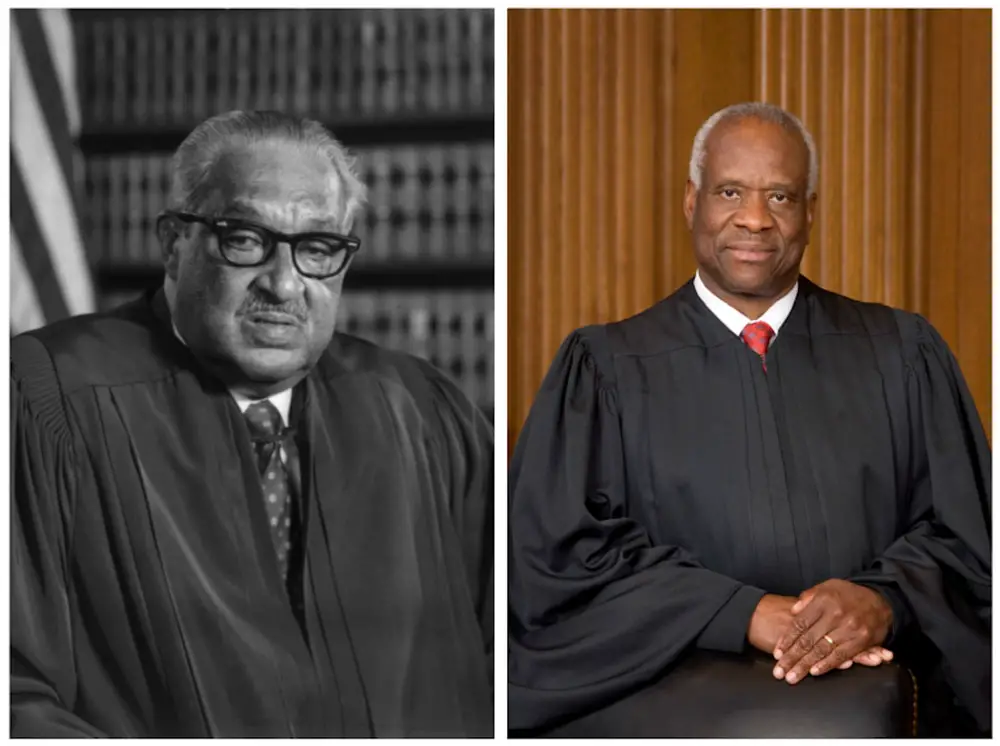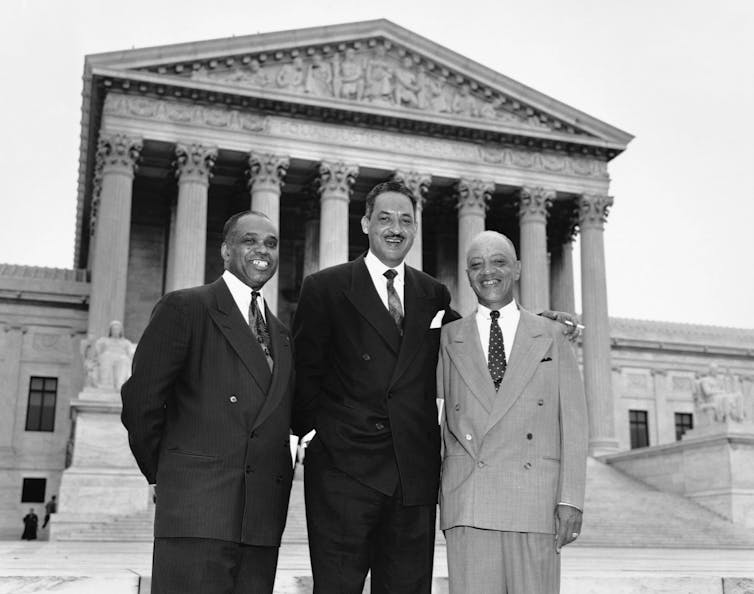
By Daniel Kiel
As public attention focuses on Supreme Court Justice Clarence Thomas’ close personal and financial relationship with a politically active conservative billionaire, the scrutiny is overlooking a key role Thomas has played for nearly three decades on the nation’s highest court.
Thomas’ predecessor on the court, Thurgood Marshall, was a civil rights lawyer before becoming a justice. In 1991, in his final opinion before retiring after a quarter century on the court, Marshall warned that his fellow justices’ growing appetite to revisit – and reverse – prior decisions would ultimately “squander the authority and legitimacy of this Court as a protector of the powerless.”
His prediction has been quoted by Supreme Court decisions since, including a three-justice dissent from the June 2022 Dobbs v. Jackson Women’s Health Organization ruling that declared there was no constitutional right to reproductive choice and overturned Roe v. Wade.
In his concurrence with the majority decision in that case, Thomas declared his opposition to Marshall’s principle, lamenting that the court had not done more to pare back its prior work. “In future cases, we should reconsider all of this Court’s substantive due process precedents,” Thomas wrote – directly implicating Americans’ rights to sexual privacy and same-sex marriage.
Throughout Thomas’ tenure he has pushed the Supreme Court to revisit prior decisions that embraced robust rights for society’s most vulnerable, and to replace Marshall’s vision with one more amenable to the powerful than the powerless. And in writing my book tracing the lives and work of both justices, I have seen the fruits of this effort multiply over the past decade.
A shield for those in need
Few phrases could so aptly capture Thurgood Marshall’s vision of the court’s work as “protector of the powerless.” And few, if any, Americans have done as much to make that vision a reality.
Marshall’s work to advance Black citizenship is well known, but he also fought for expanded rights for women and the indigent, the accused and convicted, adherents to marginalized religions and those with unpopular viewpoints.
At the root of Marshall’s jurisprudence was a hope that while law could be a powerful tool of oppression, it might also be a shield.
As he wrote in that final dissent, in Payne v. Tennessee, enforcement of constitutional rights “frequently requires this Court to rein in the forces of democratic politics,” to protect the powerless from the tyranny of the majority.
While his Payne dissent criticized the court for reversing itself, Marshall was no stranger to calling for reconsideration of established law. Marshall’s signature accomplishment as a lawyer in Brown v. Board of Education was to convince the court to overturn the doctrine of separate but equal that had emerged after the 1896 Plessy v. Ferguson decision.

Bettmann via Getty Images
As a justice, Marshall argued passionately and repeatedly that the death penalty violated the Eighth Amendment’s prohibition on cruel and unusual punishment, leading to a brief period where it was considered unconstitutional.
The distinction between Marshall and Thomas is not really about whether the court should reverse past decisions but simply which ones.
While Marshall willed the court to become a “protector of the powerless,” Thomas has, I believe, argued not only to scale that vision back, but to advance the interests of the powerful.
Power as a key factor
While last summer’s abortion decision is an obvious example, Thomas has led the court’s assault on precedent in other areas as well.
For example, years before the court invalidated portions of the Voting Rights Act in Shelby County v. Holder, Thomas had argued that the lack of modern voting discrimination made the act unnecessary.
Similarly, recent decisions have followed Thomas’ lead in weakening the vitality of the First Amendment’s Establishment Clause, which fortifies the separation between church and state.
Thomas has even called for the court to reconsider its ruling in Gideon v. Wainwright, which established a constitutional right to a lawyer for indigent criminal defendants.
In each case, it is the powerless who stand to be most significantly affected.
Those in need of constitutional protection in Thomas’ view are more likely to be property owners, corporations making campaign contributions or gun owners.
On affirmative action
Perhaps no topic better captures the distinction between the two men’s views than affirmative action, which the court is considering in a pair of cases from Harvard and the University of North Carolina to be decided this term.
The distrust of government that fuels many of Thomas’ perspectives is never more personal than in cases about the use of race in college admissions. He has railed against affirmative action, saying it brands Black people in prominent positions with a “stigma” about “whether their skin color played a part in their advancement.”
Indeed, Thomas claims his position requiring colorblindness is a better path toward full Black citizenship. He has made that claim even in situations where he knew it would result in more limited access to opportunities for Black students in the short term.
Marshall always looked at the issue from a different perspective, arguing that access to opportunities was essential not only for the Black students affected but for the nation at large.
“If we are ever to become a fully integrated society, one in which the color of a person’s skin will not determine the opportunities available to him or her,” Marshall wrote in 1977, “we must be willing to take steps to open those doors.”
It was access for the powerless that Marshall thought ought drive the thinking of the court.
But this summer, the court may finally embrace a different vision on affirmative action, coming again to a position Thomas has been advocating for decades.
That turn would be yet another reversal squandering Marshall’s vision of the court.
![]()
Daniel Kiel is FedEx Professor of Law at the University of Memphis and Author of “The Transition: Interpreting Justice from Thurgood Marshall to Clarence Thomas.”





























don miller says
how about obama and all his vacations while prez to stay at some rich guys house on martha’s vineyard before he bought there after the presidency for 8 million? or the other rich guys he stayed at when going back to Hawaii for vacation? the thing that gets me is how the media picks on repubs for the same things that are ignored when dems do it. it is obvious who they root for. Where’d Bill and Hillary stay on vacation? Martha’s of course.
JimBob says
Now that right there is the full essence of “WHATABOUTISM”!
Sherry says
Right on JimBob. . . all we ever hear from members of the FOX cult is lies and BS “talking points” including, as you pointed out, transparent, stupid “WHATABOUTISMS” . Pathetic! Really Pathetic!
Sherry says
@dm. . . please post “credible factual evidence” that President Obama received lavish vacations free of charge as “gifts” from wealthy people. Yes, the Obamas “rented” large homes for their vacations as required by their need for security.
Geezer says
Wow, the MENSA members have weighed in.
Reminds me of the “don’t eat pica” public service
announcements of the ’60s.
Eating lead paint chips did indeed severely affect
intellectual development in many kids, leading to gullibility
and GOP support in adulthood.
It’s the Miller-Rathsam Syndrome!
EUREKA! Now I know why so many voted for Trump
and DeSantis… This is like having discovered penicillin
on moldy bread!
Joseph Barand says
Every person in the America should be ashamed and disgusted because of the criminal behavior of Clarence Thomas. Can’t think of one good or even reasonable action or decision he has ever made. When history is written his picture will be used to explain the term “Uncle Tom”.
The Geode says
In other words: HOW DARE HE NOT THINK AS ALL THE OTHERS LIKE HIM ARE SUPPOSED TO…
We are the only group of people who are expected to engage in “groupthink” and are castigated when we choose to think for ourselves or don’t follow lock-step with the narrative other people set for us…
Geezer says
Oops, I forgot…
Clarence Thomas is the poster child for Oreo cookies.
I hear that he owns a cabin purchased from Harriet Beecher Stowe’s
descendants.
Laurel says
Sure, Republican mega-donor Crow gave Justice Thomas lavish vacations, but did Crow ever invite Thomas to the Club House? Another useful tool.
Jackson1955 says
Uncle Thomas’s slip is showing under his gown. For the whole world to see, whether America can clean it’s own house up, or not.
How far the Court has fallen, under the calculated influence of the GOP’S malevolent politics.
Congratulations, Chief Justice Roberts! Under your watch, you managed to destroy the reputation of the Supreme Court. Your continued inaction further cements your legacy.